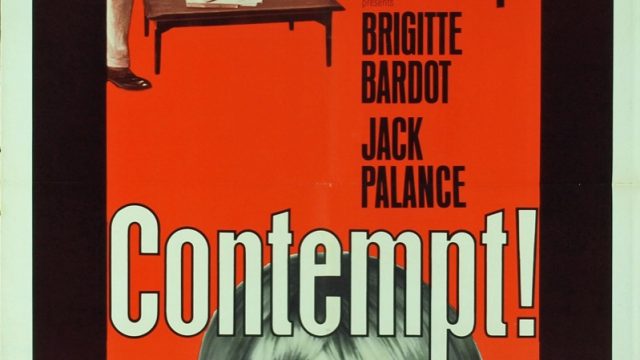Sight & Sound Voyage Entry #30
Placement On Sight & Sound Top 50 Movies List: #12
Well hello Jean-Luc Godard, we meet again. After watching Godard’s Histoire(s) du Cinema recently for this series of reviews, I was intrigued to follow up that incredibly avant-garde experience with something more a bit closer to a conventional drama with his 1963 film Contempt, something I learned after watching the movie was actually quite autobiographical in nature. Turns out, Godard made the movie in response to the troubles he was having with his wife at the time, a woman he would divorce by 1965. That’s interesting to learn though it still can’t quite make me raise my not so positive opinion on Contempt.
Writer Paul Javal (Michel Piccoli) is hired to help get a new movie version of Homer’s the Odyssey that is being directed by Fritz Lang (Lang appears as himself) by writing a new version of the film’s script. This event collides with some major marital problems transpiring between Paul and his wife Camille Javal (Brigette Bardot) that begins with Camille acting distant towards her husband at a gathering held by the producer of this new Odyssey movie. From there, Contempt follows the two as they come to terms with their newly fractured relationship, with Paul having particular difficulties accepting this new paradigm.
That’s really all there is to Contempt, with Godard even being more restrained with his editing and lighting techniques when compared to other films from the same era like Breathless and Pierrot Le Fou as there’s only brief showings of the filmmaker’s unorthodox filming touches to be found throughout the running time. Making this more of a stripped down affair reliant on limited locations and extended periods of dialogue makes the movie more evocative of a stage play, a potentially tantalizing prospect that gets undercut by just how flat and uninteresting the dialogue and the protagonist are.
Contempt really does fall flat in those two departments, with Paul Javal being a thinly sketched guy whose overcontrolling and physically abusive tendencies towards his wife (what is with all the spousal abuse in the movies I’m watching this week?) make it hard to really get interested in him, especially since Godard’s screenplay isn’t interesting in exploring either him or his wife in an in-depth fashion. They just go round and round like a dog chasing its own tail with incredibly repetitive dialogue that’s neither interesting on its own merits or illuminating on a character basis. Is Godard trying to emphasize the futility in hashing out the emotions of these individual characters when they hold so much hatred for each other?
If that was the intent behind Contempt, it really doesn’t work at all since that idea didn’t come through in their extended interactions at all. Really, all I was doing during the running time of Contempt was rooting for Camille to get the hell out of her current circumstances, though instead she just lingers in the background as the film concentrates almost entirely on Paul and his thinly-sketched plight. Michel Piccoli is OK but unremarkable in the role and that more tepid performance might help explain why the character feels lacking while Brigette Bardot does what she can with the limited material she’s given.
At least the cinematography is lovely, with Raoul Coutard getting some lovely wide shots that take full advantage of the sprawling European landscapes certain scenes of Contempt take place in. There are some nice shots in here, but they’re in service of an oddly straightforward (by the standards of a Jean-Luc Godard movie anyway) and thinly written movie that just couldn’t sustain my interest. An icky ending that violently punishes Camille for trying to seek independence from her abusive husband (oh, if only women could just not have their own individual agenda and just spend their lives sprawled out in the ocean naked being ogled by Godard and his camera) only furthers the bad taste Contempt left in my mouth.

